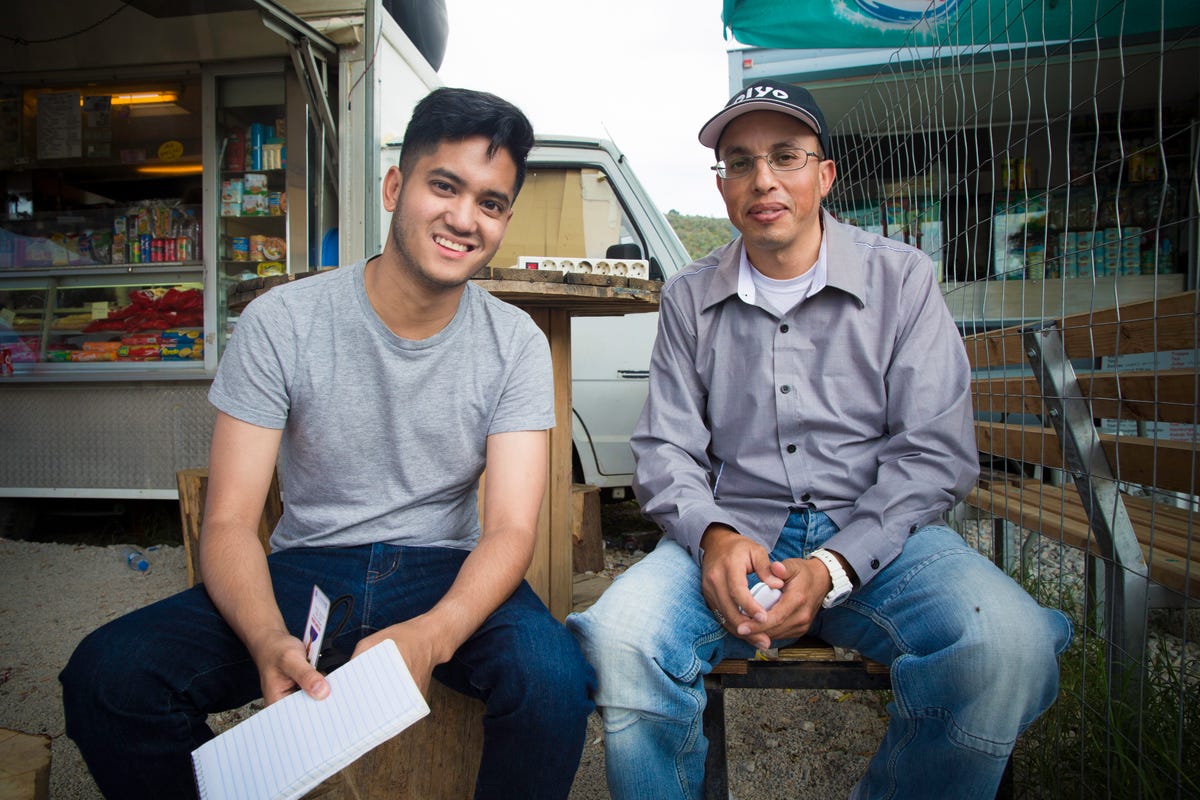

Now playing:
Watch this:
Google Translate and the refugee who wants to be Justin…
2:22
This is part of our Road Trip 2016 summer series “Life, Disrupted,” about how technology is helping with the global refugee crisis — if at all.
Of the memorable conversations I had with refugees in Greece, and there were many, this simple exchange stands out:
“My name is Rich,” I said, introducing myself to Rokan Mohammad, a 23-year-old refugee from Aleppo, Syria.
“Are you rich?” she asked.
“No,” I said, laughing.
“Then change it!” she said.
I’ve been thinking about that brief conversation a lot since getting back from a 10-day reporting trip in June. For CNET’s Road Trip project, my colleagues Ben Rubin, James Martin and I traveled through Greece to examine the role technology is playing in Europe’s migrant crisis.

Social networking apps and Google Translate are standard fare for most refugees.
James Martin/CNET
Talking to Mohammad reminded me of something all people can only really hope to have: agency — the ability to move from one situation, place or circumstance to another.
I think about the fear and doubt that must have come with Mohammad exercising her agency, making the dangerous trek across the Aegean to escape war and sacrificing everything familiar for the hope of safety.
Her decision to leave home, she said, came after a she was shot in the back by a sniper. She still carries the bullet.
I met her at City Plaza, an abandoned hotel in Athens that leftist and anarchist groups have converted into a squat for refugees. She moved there after living in Idomeni, a now-shuttered unofficial refugee camp near the Macedonian border that was notorious for its poor living conditions.
Her story wasn’t the only one I’ll remember from the trip.
Leftists and anarchists make a decent frappe
My colleagues and I visited refugee shelters of every variety: unofficial sites at Athens’ port and airport, government-run camps, several different kinds of squats and even abandoned camps.
The nicest-looking place, hands down, was City Plaza. Each refugee family has clean rooms with clean sheets. It was an abandoned building, and it now has running water, electricity and Wi-Fi. There are yoga classes and a cafe on site. Frappes cost half a euro.
There’s also a chore board and everyone has a job to do, like cooking, working at the cafe or cleaning bathrooms. You can’t live there if you don’t work. There’s one exception: A volunteer told me there’s a man in his 80s or 90s who tries to do chores, but they tell him he doesn’t have to.

 Enlarge Image
Enlarge ImageDinner is served at City Plaza, Athens’ largest squat.
James Martin/CNET
Every night, refugees and volunteers cook a big dinner. Afterward, people either help clean up, go up to their rooms or hang out in the cafe. I wandered into the kitchen, where people were doing dishes. Ben helped wash. I helped sort. People were singing and dancing to “Get Lucky” by Daft Punk and Pharrell.
In the cafe at around 11 p.m., people sat around a table, talking and eating a batch of fried calamari that the chef, a Syrian refugee, made for the cleanup crew. Among them were Han and Maia, two volunteers in their mid-twenties from Poland and Spain, respectively, who had just started working at the hotel the week before. There was also Ismail Bnaoe from Damascus, who wore a bandana tied around his long black hair and a T-shirt with pictures of guitars on it.
It seemed like the common room at a college dorm, after a night out, with people just winding down.
The boredom is serious
Every refugee I talked to was worried about their long-term future: when the border would open or when they would be able to reunite with family members in other parts of Europe. But in the short term, they’re struggling with boredom. People are in tents all day, trying to escape the scorching sun in Greece.
Most of those I spoke with just wanted someone to talk to. They wanted to tell me about the harsh conditions at the camps, their lives back home, their hopes for the future. One 15-year-old boy I met, named Omar Osman, wants to be the next Justin Bieber.

 Enlarge Image
Enlarge ImageBarbed wire surrounds the Moria detention center on the island of Lesvos.
James Martin/CNET
Others were happy to talk because they were eager to draw attention to the situation. They want to get the word out about how people can help. One of my favorite conversations was with Yahya Lagbouri, a 41-year-old from Morocco I met at the Moria detention camp on Lesvos: “Everyone can help with money or time or advice. Just smile to another person. This is help.”
A landfill can be a solemn place
One of the most moving experiences was finding the so-called life jacket memorial on the north shore of Lesvos. Just as it sounds, it’s a shrine made up of discarded life jackets that refugees used on their journey to Greece.
We searched for the place for more than an hour, armed only with pictures on our phones from blogs that had reported on it earlier and with vague directions from locals: “Drive west for half an hour. Make a left at the goat farm.”
I was expecting a pile of life jackets along the beach somewhere, maybe the size of a small room.
I was wrong. The actual place was overwhelming. There were huge mountains of life jackets and scraps of rafts, maybe eight or nine feet tall. They were stacked on top of each other, with pieces of rafts and trash scattered about. The site itself seemed to be a landfill. The smell at some places was so putrid I had to hold my breath. Flies were everywhere.
I was floored. For the past year, we’ve been hearing about the tens of thousands of refugees who’ve migrated to Greece, but it’s hard to internalize that number. These stacks of life vests were a stark reminder of how big that number really is.

 Enlarge Image
Enlarge ImageCNET’s Richard Nieva (left) with Yahya Lagbouri, a refugee from Morocco. Lagbouri said one simple way to help is to “smile at another person.”
James Martin/CNET
We stayed for an hour or so. By the time we left, the sun was setting and dogs were howling in the distance. In the dimming light, the blazing orange of the life jackets interspersed with the grays and blacks of the tattered rafts looked like burning embers.
Tech helps
Covering tech in San Francisco, it’s easy to get cynical. Company valuations and housing prices here are both skyrocketing.
But for all the flak that tech companies get (rightly) over privacy snafus or diversity blunders, it’s heartening to see the good they can provide. While someone I know is posting a selfie or political rant on Facebook, someone else halfway around the world is using the social network to find shelter in a strange new country. (Though refugees are posting selfies and political rants, too. Remember the boredom thing?) They’re chatting with family back home on WhatsApp and Skype. And they’re using the Google Translate app to talk to their new neighbors in their makeshift homes, even if they don’t speak the same language.
I’m used to hearing companies boast about their user figures all the time. Facebook has 1.65 billion people on its social network. Google has six products with more than a billion users, including YouTube, search and Maps. WhatsApp has a billion, too.
But I rarely ever thought about who those billion people are. Or how they’re using the services. Or where they live. Now I do.



